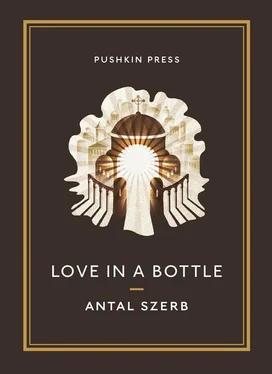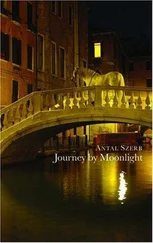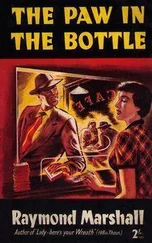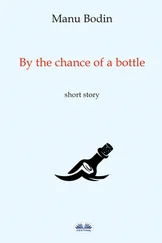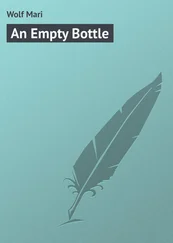Antal Szerb - Love in a Bottle
Здесь есть возможность читать онлайн «Antal Szerb - Love in a Bottle» весь текст электронной книги совершенно бесплатно (целиком полную версию без сокращений). В некоторых случаях можно слушать аудио, скачать через торрент в формате fb2 и присутствует краткое содержание. Год выпуска: 2013, Издательство: Pushkin Press, Жанр: Классическая проза, на английском языке. Описание произведения, (предисловие) а так же отзывы посетителей доступны на портале библиотеки ЛибКат.
- Название:Love in a Bottle
- Автор:
- Издательство:Pushkin Press
- Жанр:
- Год:2013
- ISBN:нет данных
- Рейтинг книги:5 / 5. Голосов: 1
-
Избранное:Добавить в избранное
- Отзывы:
-
Ваша оценка:
- 100
- 1
- 2
- 3
- 4
- 5
Love in a Bottle: краткое содержание, описание и аннотация
Предлагаем к чтению аннотацию, описание, краткое содержание или предисловие (зависит от того, что написал сам автор книги «Love in a Bottle»). Если вы не нашли необходимую информацию о книге — напишите в комментариях, мы постараемся отыскать её.
and
.
Love in a Bottle — читать онлайн бесплатно полную книгу (весь текст) целиком
Ниже представлен текст книги, разбитый по страницам. Система сохранения места последней прочитанной страницы, позволяет с удобством читать онлайн бесплатно книгу «Love in a Bottle», без необходимости каждый раз заново искать на чём Вы остановились. Поставьте закладку, и сможете в любой момент перейти на страницу, на которой закончили чтение.
Интервал:
Закладка:
The embers clung to their waning life, and the couples leapt through it one after another in response to the changing lines of the song. Then when everyone had taken St John’s blessing, the lads came to a stop facing the girls. One of the younger girls would now have to run between the lines shouting, “Lidi Miller’s house is burning, put it out, put it out”. She would then be followed by all the publicly acknowledged couples, starting with the last in line, the girl running ahead of the boy. But when the boys got themselves in position to set off down the line, they realised that none of the younger girls were where they should have been. They had all been sent home to bed, in order not to lose face. The only ones left standing opposite their partners and waiting to run were those already betrothed. Just one unattached girl remained on the scene, a mere child, the miller’s youngest daughter, aged fifteen. Her grandmother had sent her over with instructions to run down the line shouting the required words so that the couples would not be disappointed. She approached with a smile on her face that was a joy to see — but as she grew closer, and cast her eye over the many fine young men standing there with their partners, she burst into tears and ran away, sulking.
Few of the villagers, being all (the women especially) so busy with their plans and dreaming up little love nests for the couples, can have spared a thought for that one little girl among all the others, now wandering somewhere out of sight, alone. The song and the games continued, nor did the miller’s old mother forget to bake the ceremonial herbs over the flames, and the revels went on until suddenly it was very late, and with the next day’s labours in mind they all set off homewards.
Ajándok — for that was the little girl’s name — was the late-born child of elderly parents. She wandered through the gardens, not bothering to dry her weeping eyes, her lips red from sulking and her mouth turned down, reluctant to venture as far as the main road. It was a wonderfully clear night, full of palpitating stars, with not a single cloud in all its pathless expanse. Peering through hedges, she could make out, here and there, broken-down old people sitting in the porches in front of their houses, their faces gazing up at the shining galaxies. Even the dogs were silent. Perhaps they had all gone off to celebrate in some other place, where their kind have a seat at their masters’ bone-covered tables. At the far end stood the windmill, its huge four-armed sails motionless, as under a spell, with not a whisper of wind to drive them.
“Perhaps I should just throw myself in the river,” the child thought sadly. “The fishermen would haul me up in their nets before dawn, with golden fishes in my hair, and lay my body out in the market square, and everyone would come and cry over me, and a rich and powerful man would take me back to the village in a golden coach, and my parents would wail and weep, and say: ‘She was such a little thing when she was alive, and now she’s dead, and she was the most beautiful of all of them.’ And a hundred young men would come and stare at me, but it would be too late, my mouth would be cold and white, and I would be all cold and white, as white as a lily.”
Ajándok was indeed beautiful, as beautiful as fairy gossamer, soft and supple, with long golden hair. But she was still very young, not yet marriageable, not at all ready to be led away as a bride. And she was as solitary as a river by night. She gazed long and thoughtfully at her barely rounded arms, thinking of the future bridegroom she would one day cradle in them — the young man who had only now set out across unimaginably distant seas, his road beset by every sort of terror — and she grieved that the lamp in her eyes could never cast its beam to that faraway place because it was running out of oil and, one night soon, would die out altogether.
She had now reached the silent mill. It lay in darkness. The sight of its mute sails deepened her loneliness and made the far-off stranger seem even more hopelessly remote. Somewhere in its kitchen darkness was preparing dinner, and oh! she wished, if only the mill could suddenly launch itself into the sky above the fields, like a terrifying bird of the night, clanking and rattling as it flew, and reach heaven by dawn! In heaven, among the golden clouds… that was where she would find her rest.
A merry din was heard as everyone — the miller, his mother, Lidi, Bálint, the serving girls and the young workmen — came banging their way up the wooden stairs and into the mill. The long table was already laid and waiting. There was to be a double celebration that night, for the moment they arrived at the front door Bálint had gone up to the miller, doffed his cap and asked for Lidi’s hand in marriage. There had been none of the customary sending of an apple, or a woman with two oven mops, or the man with the flask of wine: this suitor had no need of such tokens — the couple had understood one another quite long enough. Nor was there any of the ritual wrangling between the families, just handshakes all round, the men crowding round Bálint to pump his hand and the women showering Lidi with kisses. Ajándok went over, fell on her older sister’s neck in tears, then promptly ran out of the room.
After waiting a suitable length of time for her to calm down and become more amenable, her grandmother went to see how she was. She tracked her down to the woodshed, where she was sitting on a pile of logs.
“Why are you crying, my pretty flower? Tell me why.”
Ajándok made no answer. She did not know what to say. She just clung to her granny’s shoulder while the sobs shook her like a winnowing sieve.
“My little one, my blessed girl, don’t cry. Haven’t you got a lovely father to guide your thoughts, and your beautiful older sister, see, who’s now become engaged? Who ever saw anyone cry on such a wonderful day? You have everything you could possibly want. You’ve got your pussy-cat Mirók, the little scamp, with a silk ribbon round his neck, and your lovely shock-headed doll Faraj. Nobody sends you out into the fields at dawn to sweep up the gleanings. You live like the fairy Ilona. You aren’t like any of the other girls. You have lovely blonde hair, my angel, and the colour of the ever-faithful forget-me-not in your eyes. Your skin is finer, your bones are more delicate than other people’s, and we take such good care to shelter you from the sun, and the wind, and nasty words that put a curse on you — so you really mustn’t cry.”
Ajándok replied: “It’s no use — not even if Mirók and Lidi, and Faraj, and all the treasures of the fairy Ilona were tucked under my pillow… Granny, I’m so alone in this big wide world.”
“Ah, now I see. So the little girl would like to be a big girl, is that right, my little lily-of-the-valley? I know only too well what a bitter thing it is to be single on flowery St John’s Night and not have a young man. At times like this a girl is like a look-out tree. There she stands, all alone, naked to the wind, gazing around the wide meadow for days on end, waiting for the time for when she will finally be fed with the sweet food of the heart… and then, just before dawn, she hears the neighing of horses telling someone: ‘That’s where the miller’s beautiful daughter lives’—and the bridegroom enters, with dust on his boots, and a diamond-studded whip in his hand.”
“Granny… if you really know everything… tell me when he will come, and what sort of man he will be.”
The old lady became serious.
“You are asking me a very big thing, my flower. It’s not for us to look for short cuts to find out what the future will bring in its own good time. But you know there is a way to do it, and it’s lucky that you ask me this question on St John’s Night, because it’s the best time for every sort of magic. So keep your ears open, my girl, and make the sign of the cross, in case some passing evil spirit should overhear our conversation and draw near.”
Читать дальшеИнтервал:
Закладка:
Похожие книги на «Love in a Bottle»
Представляем Вашему вниманию похожие книги на «Love in a Bottle» списком для выбора. Мы отобрали схожую по названию и смыслу литературу в надежде предоставить читателям больше вариантов отыскать новые, интересные, ещё непрочитанные произведения.
Обсуждение, отзывы о книге «Love in a Bottle» и просто собственные мнения читателей. Оставьте ваши комментарии, напишите, что Вы думаете о произведении, его смысле или главных героях. Укажите что конкретно понравилось, а что нет, и почему Вы так считаете.
